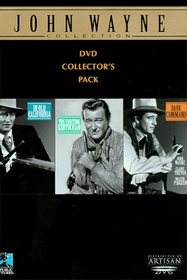| Actors: John Wayne, Vera Ralston, Binnie Barnes, Claire Trevor, Philip Dorn Directors: George Waggner, Raoul Walsh, William C. McGann Creators: George Waggner, F. Hugh Herbert, Frances Hyland, Gertrude Purcell, Gladys Atwater Genres: Action & Adventure, Westerns Sub-Genres: John Wayne, Westerns Studio: Republic Pictures Format: DVD - Black and White,Color DVD Release Date: 11/23/1999 Original Release Date: 09/15/1949 Theatrical Release Date: 09/15/1949 Release Year: 1999 Run Time: 4hr 44min Screens: Black and White,Color Number of Discs: 3 SwapaDVD Credits: 3 Total Copies: 0 Members Wishing: 0 Edition: Box set MPAA Rating: NR (Not Rated) Languages: English See Also: |
Search - The John Wayne Collection, Vol. 2 on DVD
  | The John Wayne Collection Vol 2 Actors: John Wayne, Vera Ralston, Binnie Barnes, Claire Trevor, Philip Dorn Directors: George Waggner, Raoul Walsh, William C. McGann Genres: Action & Adventure, Westerns NR 1999 4hr 44min Here's something you don't see every day. Then again, would you want to? Several years before the 1950s' Davy Crockett craze, John Wayne donned a coonskin cap to play a militiaman in early-19th-century Alabama. He and his ... more » |
Larger Image |
Movie DetailsSimilar Movies
|
Movie ReviewsAnother off-beat role for The DUKE! Mark Savary | Seattle, WA | 06/19/2001 (3 out of 5 stars) ""The Fighting Kentuckian" is the second movie that The DUKE produced for Republic Pictures. Unfortunately, while the first project, "Angel and the Badman" was a great success, this movie bordered on disaster.In order to be given producing credit, DUKE had to hire the studio boss's girlfriend (Vera Ralston), to star opposite him. He knew she'd be no good for the picture, but DUKE's hands were tied.One problem with Vera Ralston was that she had a Czech accent. The role she was playing was supposed to be a French woman! In the end, all the French characters had to be cast with Czechs and other Eastern Europeans so Ralston's accent would not stand out. While not embarrassing herself too badly here, Ralston was not a real actress, and it shows.Oliver Hardy is great as DUKE's sidekick, although he was reluctant to do a project without his partner, Stan Laurel. Hardy had worked in a play with DUKE and John Ford just before filming began on "The Fighting Kentuckian", and DUKE really wanted Hardy in his next project. Hardy only agreed after Laurel, ill at the time, talked him into it.There's quite a bit that's out of place here. Mixing the Louisiana river traders with French Army ex-patriots is a weird bit of psudo-history, made even more weird by the unlikely addition of the Kentucky Regiment that Wayne and Hardy are part of.DUKE is still DUKE, and Hardy is fun, but otherwise this overblown costume drama is not very memorable.The print Artisan used for the DVD transfer is pretty poor, too. For DUKE or Hardy completists, only." Delightful old time hollywood frontier story jenbird | 12/08/1998 (4 out of 5 stars) "The Fighting Kentuckian is a frontier classic that's a perfect John Wayne vehicle. Its the type of picture that I would stay up till one am to see when I was a boy in the early 60's. The old style marching, singing, and fighting is a fine escape for its duration. Not realistic and all old time Hollywood I would recomend it to anyone just for the fun of it." THE HARDY DUKE wdanthemanw | Geneva, Switzerland | 05/05/2007 (4 out of 5 stars) "Produced by John Wayne, written and directed by George Waggner, THE FIGHTING KENTUCKIAN was a real surprise for me. In fact, the film has a poor reputation among movie buffs. But I personally didn't mind the Czech accent of Vera Ralston who was supposed to play the French born daughter of a Napoleon army's general. I even enjoyed very much the scenes she had with John Wayne and the sensualness she put into Fleurette De Marchand character. I also honestly admit that the comic situations of THE FIGHTING KENTUCKIAN, all generated by Oliver Hardy, are not always top notch, specially when the gags seem to have suddenly popped up from a silent movie. But I don't disavow the pleasure I had to admire the seduction scenes played by Vera Ralston that alone justify a rental of the film. A DVD zone John Wayne's reserved shelf. " A Romantic "Eastern", not Western Jan Peczkis | Chicago IL, USA | 06/15/2008 (4 out of 5 stars) "John Wayne is well known for his westerns. The setting of this 1949 flick is Alabama, involving men who came from Kentucky. So this is technically an "eastern". The scenes are apt for the early 1800's: Soldiers are still using flintlocks, Alabama is about to be admitted to the Union as a state, and there is a large group of French citizens exiled after Napoleon's ignominious defeats.
John Breen (John Wayne) falls in love with a French woman. Trouble is, she is already earmarked for an arranged marriage to another man. A love triangle develops. Breen is determined to marry her. But he adds to the problems by pretending that he is a surveyor. He also finds out that there is a scheme afoot to defraud the French of some of their property by moving the posts that define the boundaries of the property. This flick is more than a love story. It pushes the American way over the then-European way. The American way is progressive and the European way is traditional. In the American way, women marry whomever they love and whomever they choose to marry. In the then-European way, women married according to arranged marriages. These were usually based on social class, the wealth of the suitor, and the professional connections of the suitor with the father of the bride. The bride's wishes counted for little. " |






